Analysis of Challenges in Organizational Change Management Field
VerifiedAdded on 2021/05/31
|11
|3009
|28
Report
AI Summary
This report delves into the multifaceted challenges encountered in the field of organizational change management. It begins with an introduction to the subject, highlighting the importance of change management in today's dynamic business environment. The core of the report is a literature review that explores various challenges, including resistance to change, an unknown current state, integration issues, competitive forces, organizational complexity, planning failures, lack of consensus, communication failures, and employee resistance. Each challenge is examined from multiple perspectives, drawing on the insights of different authors. The report also provides a critique of the literature, acknowledging the strengths and weaknesses of the arguments presented. The analysis evaluates the research, the depth of the arguments, and the practicality of the solutions proposed, thereby offering a comprehensive understanding of the obstacles faced by organizations undergoing change. The report concludes by synthesizing the key findings and offering a holistic view of the challenges in organizational change management, making it a valuable resource for students and professionals alike.
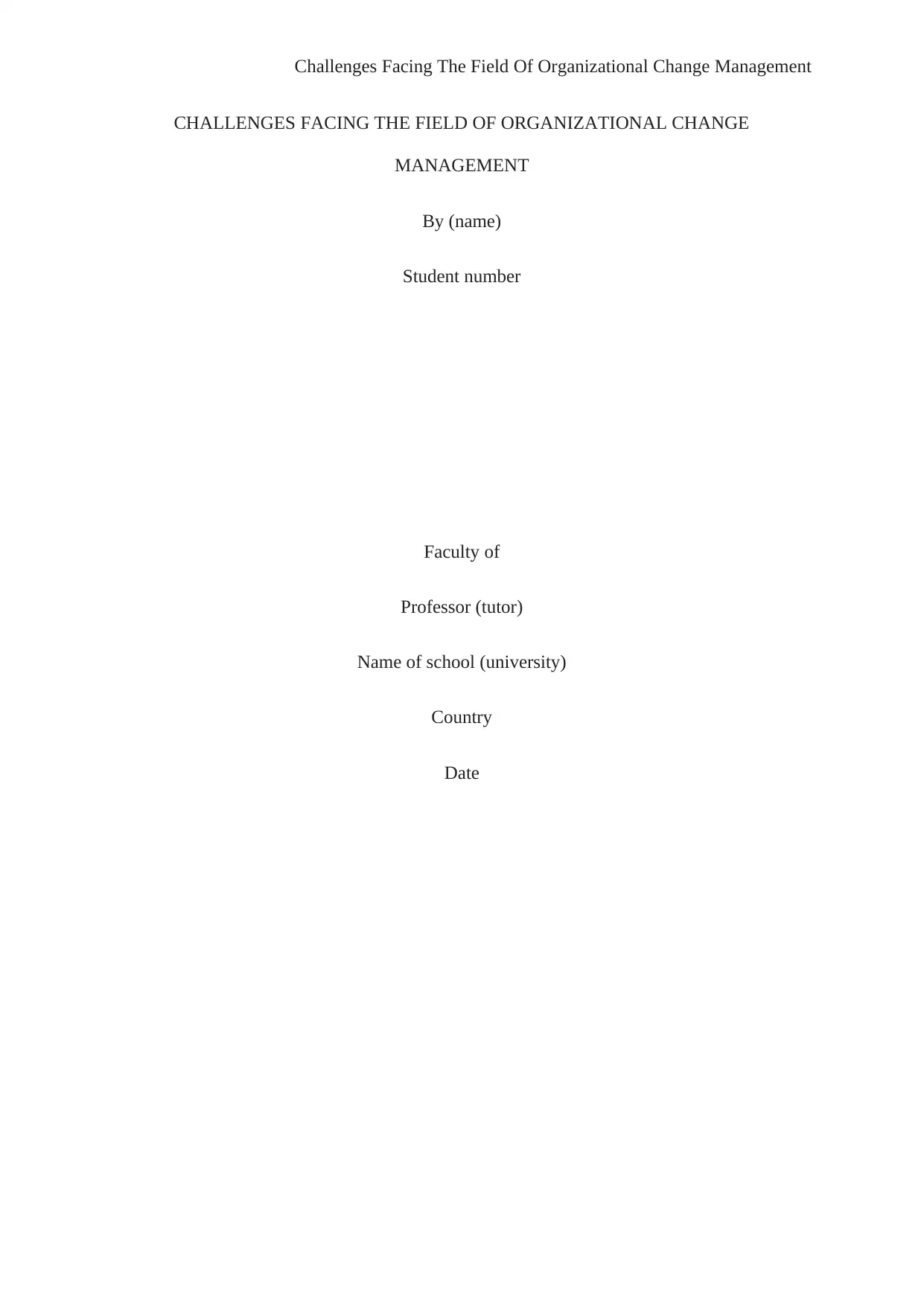
Challenges Facing The Field Of Organizational Change Management
CHALLENGES FACING THE FIELD OF ORGANIZATIONAL CHANGE
MANAGEMENT
By (name)
Student number
Faculty of
Professor (tutor)
Name of school (university)
Country
Date
CHALLENGES FACING THE FIELD OF ORGANIZATIONAL CHANGE
MANAGEMENT
By (name)
Student number
Faculty of
Professor (tutor)
Name of school (university)
Country
Date
Paraphrase This Document
Need a fresh take? Get an instant paraphrase of this document with our AI Paraphraser
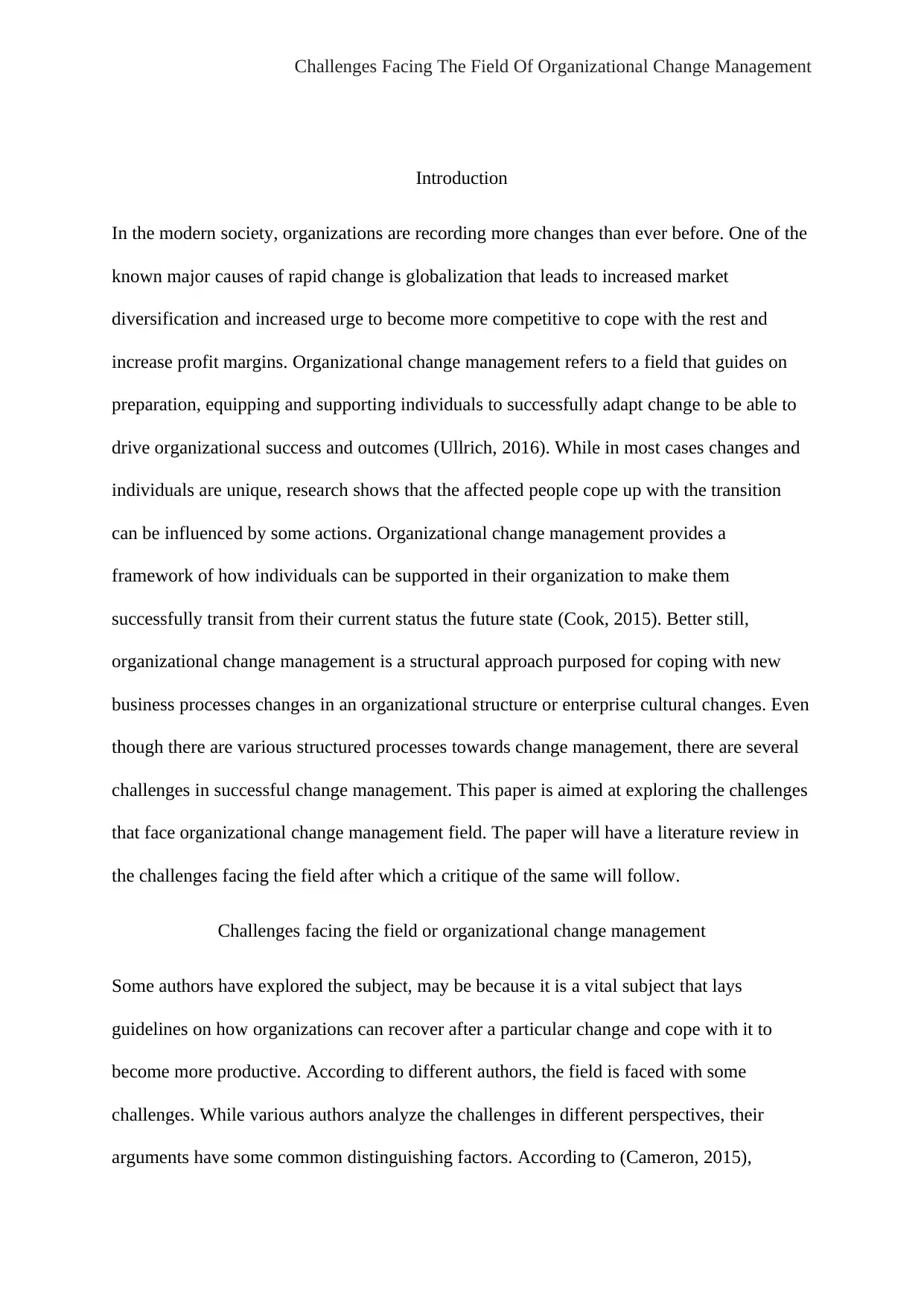
Challenges Facing The Field Of Organizational Change Management
Introduction
In the modern society, organizations are recording more changes than ever before. One of the
known major causes of rapid change is globalization that leads to increased market
diversification and increased urge to become more competitive to cope with the rest and
increase profit margins. Organizational change management refers to a field that guides on
preparation, equipping and supporting individuals to successfully adapt change to be able to
drive organizational success and outcomes (Ullrich, 2016). While in most cases changes and
individuals are unique, research shows that the affected people cope up with the transition
can be influenced by some actions. Organizational change management provides a
framework of how individuals can be supported in their organization to make them
successfully transit from their current status the future state (Cook, 2015). Better still,
organizational change management is a structural approach purposed for coping with new
business processes changes in an organizational structure or enterprise cultural changes. Even
though there are various structured processes towards change management, there are several
challenges in successful change management. This paper is aimed at exploring the challenges
that face organizational change management field. The paper will have a literature review in
the challenges facing the field after which a critique of the same will follow.
Challenges facing the field or organizational change management
Some authors have explored the subject, may be because it is a vital subject that lays
guidelines on how organizations can recover after a particular change and cope with it to
become more productive. According to different authors, the field is faced with some
challenges. While various authors analyze the challenges in different perspectives, their
arguments have some common distinguishing factors. According to (Cameron, 2015),
Introduction
In the modern society, organizations are recording more changes than ever before. One of the
known major causes of rapid change is globalization that leads to increased market
diversification and increased urge to become more competitive to cope with the rest and
increase profit margins. Organizational change management refers to a field that guides on
preparation, equipping and supporting individuals to successfully adapt change to be able to
drive organizational success and outcomes (Ullrich, 2016). While in most cases changes and
individuals are unique, research shows that the affected people cope up with the transition
can be influenced by some actions. Organizational change management provides a
framework of how individuals can be supported in their organization to make them
successfully transit from their current status the future state (Cook, 2015). Better still,
organizational change management is a structural approach purposed for coping with new
business processes changes in an organizational structure or enterprise cultural changes. Even
though there are various structured processes towards change management, there are several
challenges in successful change management. This paper is aimed at exploring the challenges
that face organizational change management field. The paper will have a literature review in
the challenges facing the field after which a critique of the same will follow.
Challenges facing the field or organizational change management
Some authors have explored the subject, may be because it is a vital subject that lays
guidelines on how organizations can recover after a particular change and cope with it to
become more productive. According to different authors, the field is faced with some
challenges. While various authors analyze the challenges in different perspectives, their
arguments have some common distinguishing factors. According to (Cameron, 2015),
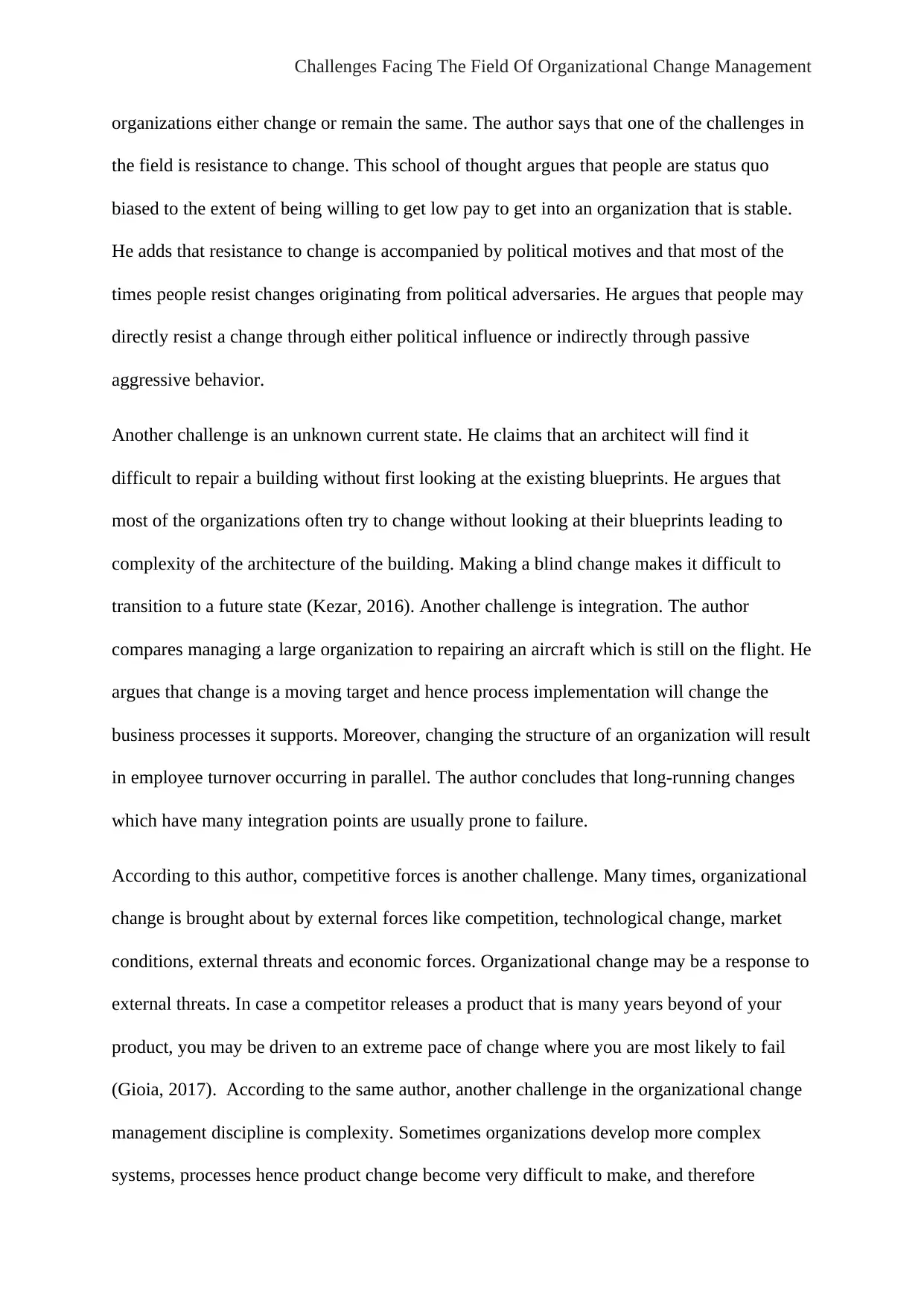
Challenges Facing The Field Of Organizational Change Management
organizations either change or remain the same. The author says that one of the challenges in
the field is resistance to change. This school of thought argues that people are status quo
biased to the extent of being willing to get low pay to get into an organization that is stable.
He adds that resistance to change is accompanied by political motives and that most of the
times people resist changes originating from political adversaries. He argues that people may
directly resist a change through either political influence or indirectly through passive
aggressive behavior.
Another challenge is an unknown current state. He claims that an architect will find it
difficult to repair a building without first looking at the existing blueprints. He argues that
most of the organizations often try to change without looking at their blueprints leading to
complexity of the architecture of the building. Making a blind change makes it difficult to
transition to a future state (Kezar, 2016). Another challenge is integration. The author
compares managing a large organization to repairing an aircraft which is still on the flight. He
argues that change is a moving target and hence process implementation will change the
business processes it supports. Moreover, changing the structure of an organization will result
in employee turnover occurring in parallel. The author concludes that long-running changes
which have many integration points are usually prone to failure.
According to this author, competitive forces is another challenge. Many times, organizational
change is brought about by external forces like competition, technological change, market
conditions, external threats and economic forces. Organizational change may be a response to
external threats. In case a competitor releases a product that is many years beyond of your
product, you may be driven to an extreme pace of change where you are most likely to fail
(Gioia, 2017). According to the same author, another challenge in the organizational change
management discipline is complexity. Sometimes organizations develop more complex
systems, processes hence product change become very difficult to make, and therefore
organizations either change or remain the same. The author says that one of the challenges in
the field is resistance to change. This school of thought argues that people are status quo
biased to the extent of being willing to get low pay to get into an organization that is stable.
He adds that resistance to change is accompanied by political motives and that most of the
times people resist changes originating from political adversaries. He argues that people may
directly resist a change through either political influence or indirectly through passive
aggressive behavior.
Another challenge is an unknown current state. He claims that an architect will find it
difficult to repair a building without first looking at the existing blueprints. He argues that
most of the organizations often try to change without looking at their blueprints leading to
complexity of the architecture of the building. Making a blind change makes it difficult to
transition to a future state (Kezar, 2016). Another challenge is integration. The author
compares managing a large organization to repairing an aircraft which is still on the flight. He
argues that change is a moving target and hence process implementation will change the
business processes it supports. Moreover, changing the structure of an organization will result
in employee turnover occurring in parallel. The author concludes that long-running changes
which have many integration points are usually prone to failure.
According to this author, competitive forces is another challenge. Many times, organizational
change is brought about by external forces like competition, technological change, market
conditions, external threats and economic forces. Organizational change may be a response to
external threats. In case a competitor releases a product that is many years beyond of your
product, you may be driven to an extreme pace of change where you are most likely to fail
(Gioia, 2017). According to the same author, another challenge in the organizational change
management discipline is complexity. Sometimes organizations develop more complex
systems, processes hence product change become very difficult to make, and therefore
⊘ This is a preview!⊘
Do you want full access?
Subscribe today to unlock all pages.

Trusted by 1+ million students worldwide
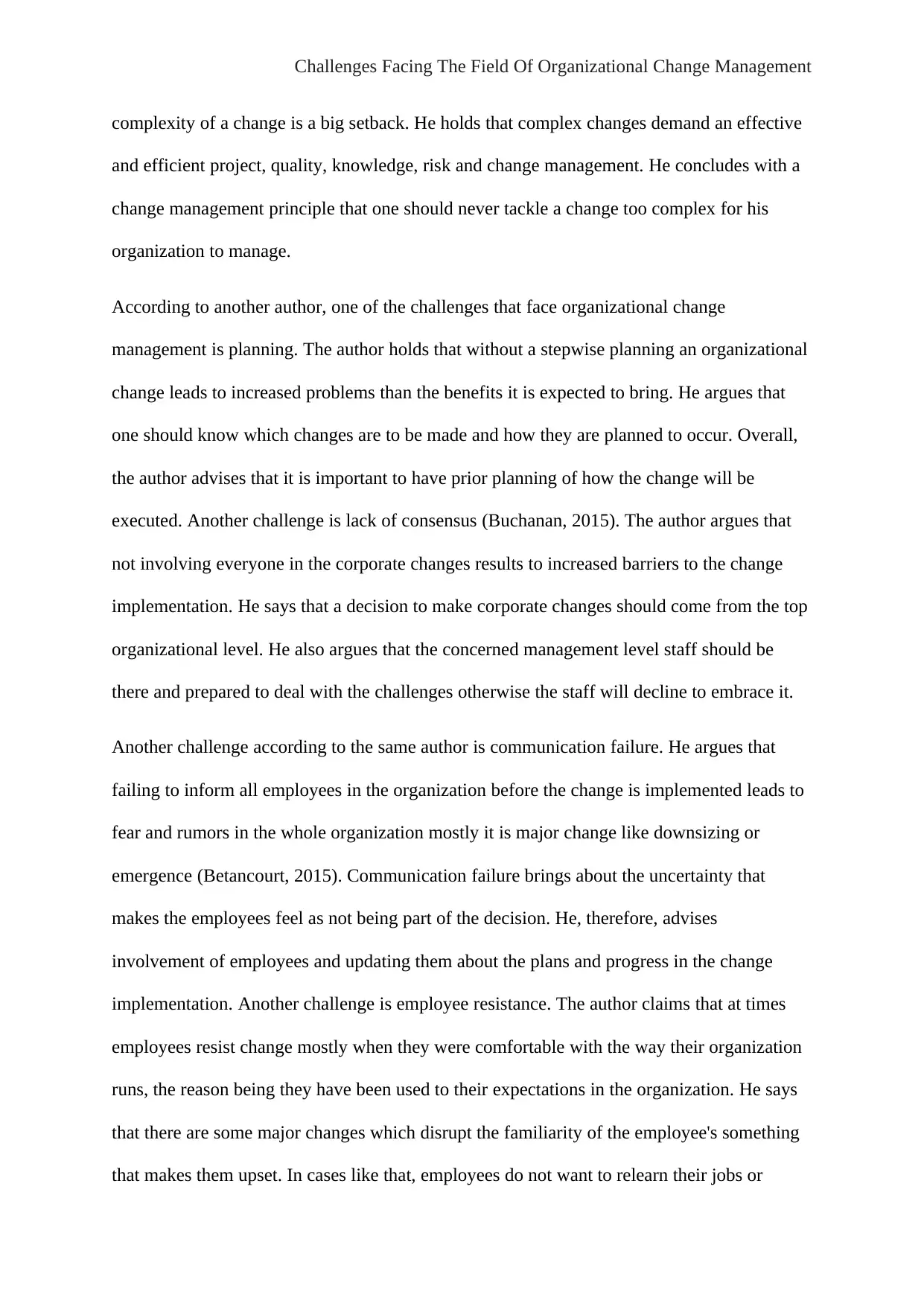
Challenges Facing The Field Of Organizational Change Management
complexity of a change is a big setback. He holds that complex changes demand an effective
and efficient project, quality, knowledge, risk and change management. He concludes with a
change management principle that one should never tackle a change too complex for his
organization to manage.
According to another author, one of the challenges that face organizational change
management is planning. The author holds that without a stepwise planning an organizational
change leads to increased problems than the benefits it is expected to bring. He argues that
one should know which changes are to be made and how they are planned to occur. Overall,
the author advises that it is important to have prior planning of how the change will be
executed. Another challenge is lack of consensus (Buchanan, 2015). The author argues that
not involving everyone in the corporate changes results to increased barriers to the change
implementation. He says that a decision to make corporate changes should come from the top
organizational level. He also argues that the concerned management level staff should be
there and prepared to deal with the challenges otherwise the staff will decline to embrace it.
Another challenge according to the same author is communication failure. He argues that
failing to inform all employees in the organization before the change is implemented leads to
fear and rumors in the whole organization mostly it is major change like downsizing or
emergence (Betancourt, 2015). Communication failure brings about the uncertainty that
makes the employees feel as not being part of the decision. He, therefore, advises
involvement of employees and updating them about the plans and progress in the change
implementation. Another challenge is employee resistance. The author claims that at times
employees resist change mostly when they were comfortable with the way their organization
runs, the reason being they have been used to their expectations in the organization. He says
that there are some major changes which disrupt the familiarity of the employee's something
that makes them upset. In cases like that, employees do not want to relearn their jobs or
complexity of a change is a big setback. He holds that complex changes demand an effective
and efficient project, quality, knowledge, risk and change management. He concludes with a
change management principle that one should never tackle a change too complex for his
organization to manage.
According to another author, one of the challenges that face organizational change
management is planning. The author holds that without a stepwise planning an organizational
change leads to increased problems than the benefits it is expected to bring. He argues that
one should know which changes are to be made and how they are planned to occur. Overall,
the author advises that it is important to have prior planning of how the change will be
executed. Another challenge is lack of consensus (Buchanan, 2015). The author argues that
not involving everyone in the corporate changes results to increased barriers to the change
implementation. He says that a decision to make corporate changes should come from the top
organizational level. He also argues that the concerned management level staff should be
there and prepared to deal with the challenges otherwise the staff will decline to embrace it.
Another challenge according to the same author is communication failure. He argues that
failing to inform all employees in the organization before the change is implemented leads to
fear and rumors in the whole organization mostly it is major change like downsizing or
emergence (Betancourt, 2015). Communication failure brings about the uncertainty that
makes the employees feel as not being part of the decision. He, therefore, advises
involvement of employees and updating them about the plans and progress in the change
implementation. Another challenge is employee resistance. The author claims that at times
employees resist change mostly when they were comfortable with the way their organization
runs, the reason being they have been used to their expectations in the organization. He says
that there are some major changes which disrupt the familiarity of the employee's something
that makes them upset. In cases like that, employees do not want to relearn their jobs or
Paraphrase This Document
Need a fresh take? Get an instant paraphrase of this document with our AI Paraphraser
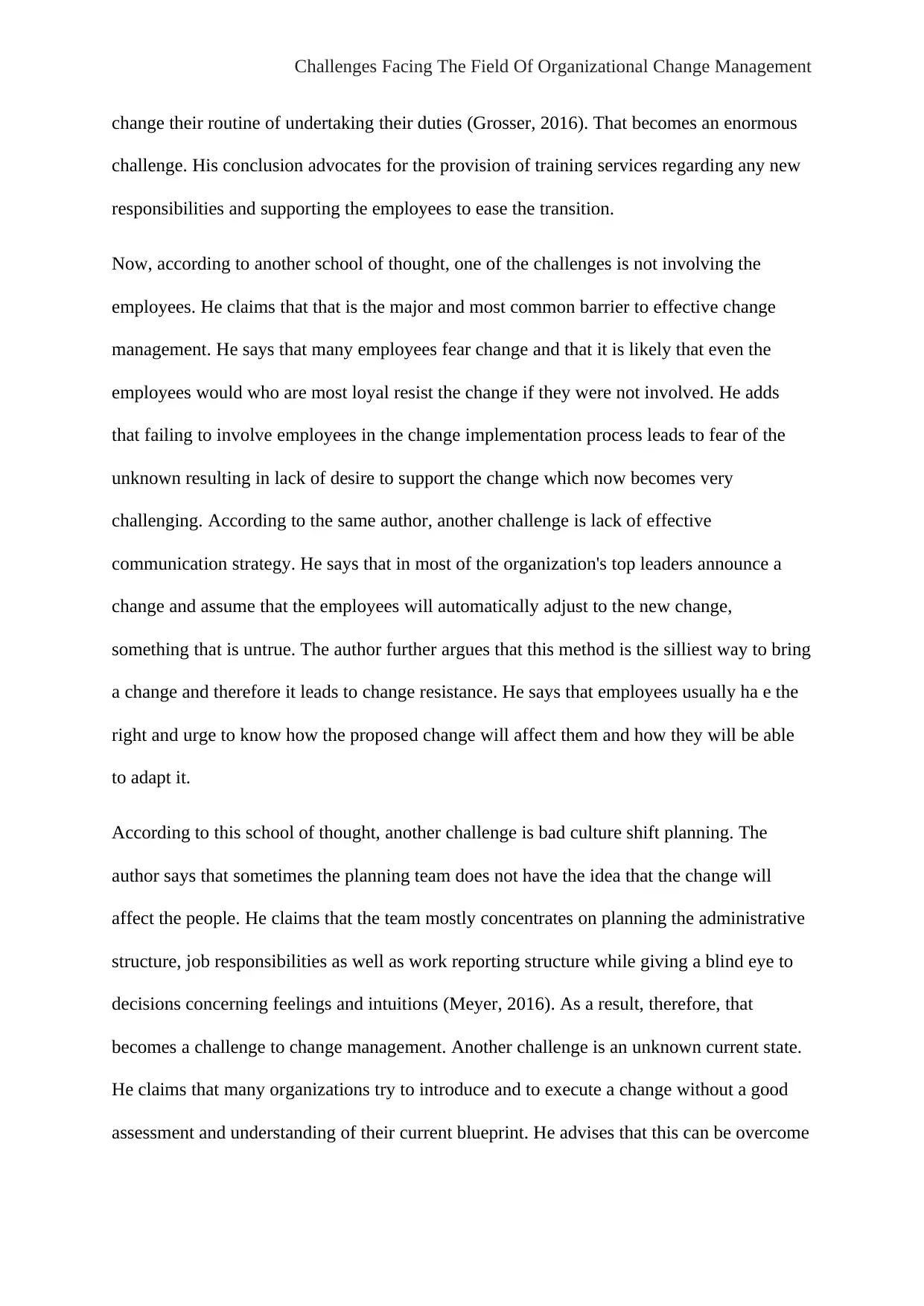
Challenges Facing The Field Of Organizational Change Management
change their routine of undertaking their duties (Grosser, 2016). That becomes an enormous
challenge. His conclusion advocates for the provision of training services regarding any new
responsibilities and supporting the employees to ease the transition.
Now, according to another school of thought, one of the challenges is not involving the
employees. He claims that that is the major and most common barrier to effective change
management. He says that many employees fear change and that it is likely that even the
employees would who are most loyal resist the change if they were not involved. He adds
that failing to involve employees in the change implementation process leads to fear of the
unknown resulting in lack of desire to support the change which now becomes very
challenging. According to the same author, another challenge is lack of effective
communication strategy. He says that in most of the organization's top leaders announce a
change and assume that the employees will automatically adjust to the new change,
something that is untrue. The author further argues that this method is the silliest way to bring
a change and therefore it leads to change resistance. He says that employees usually ha e the
right and urge to know how the proposed change will affect them and how they will be able
to adapt it.
According to this school of thought, another challenge is bad culture shift planning. The
author says that sometimes the planning team does not have the idea that the change will
affect the people. He claims that the team mostly concentrates on planning the administrative
structure, job responsibilities as well as work reporting structure while giving a blind eye to
decisions concerning feelings and intuitions (Meyer, 2016). As a result, therefore, that
becomes a challenge to change management. Another challenge is an unknown current state.
He claims that many organizations try to introduce and to execute a change without a good
assessment and understanding of their current blueprint. He advises that this can be overcome
change their routine of undertaking their duties (Grosser, 2016). That becomes an enormous
challenge. His conclusion advocates for the provision of training services regarding any new
responsibilities and supporting the employees to ease the transition.
Now, according to another school of thought, one of the challenges is not involving the
employees. He claims that that is the major and most common barrier to effective change
management. He says that many employees fear change and that it is likely that even the
employees would who are most loyal resist the change if they were not involved. He adds
that failing to involve employees in the change implementation process leads to fear of the
unknown resulting in lack of desire to support the change which now becomes very
challenging. According to the same author, another challenge is lack of effective
communication strategy. He says that in most of the organization's top leaders announce a
change and assume that the employees will automatically adjust to the new change,
something that is untrue. The author further argues that this method is the silliest way to bring
a change and therefore it leads to change resistance. He says that employees usually ha e the
right and urge to know how the proposed change will affect them and how they will be able
to adapt it.
According to this school of thought, another challenge is bad culture shift planning. The
author says that sometimes the planning team does not have the idea that the change will
affect the people. He claims that the team mostly concentrates on planning the administrative
structure, job responsibilities as well as work reporting structure while giving a blind eye to
decisions concerning feelings and intuitions (Meyer, 2016). As a result, therefore, that
becomes a challenge to change management. Another challenge is an unknown current state.
He claims that many organizations try to introduce and to execute a change without a good
assessment and understanding of their current blueprint. He advises that this can be overcome
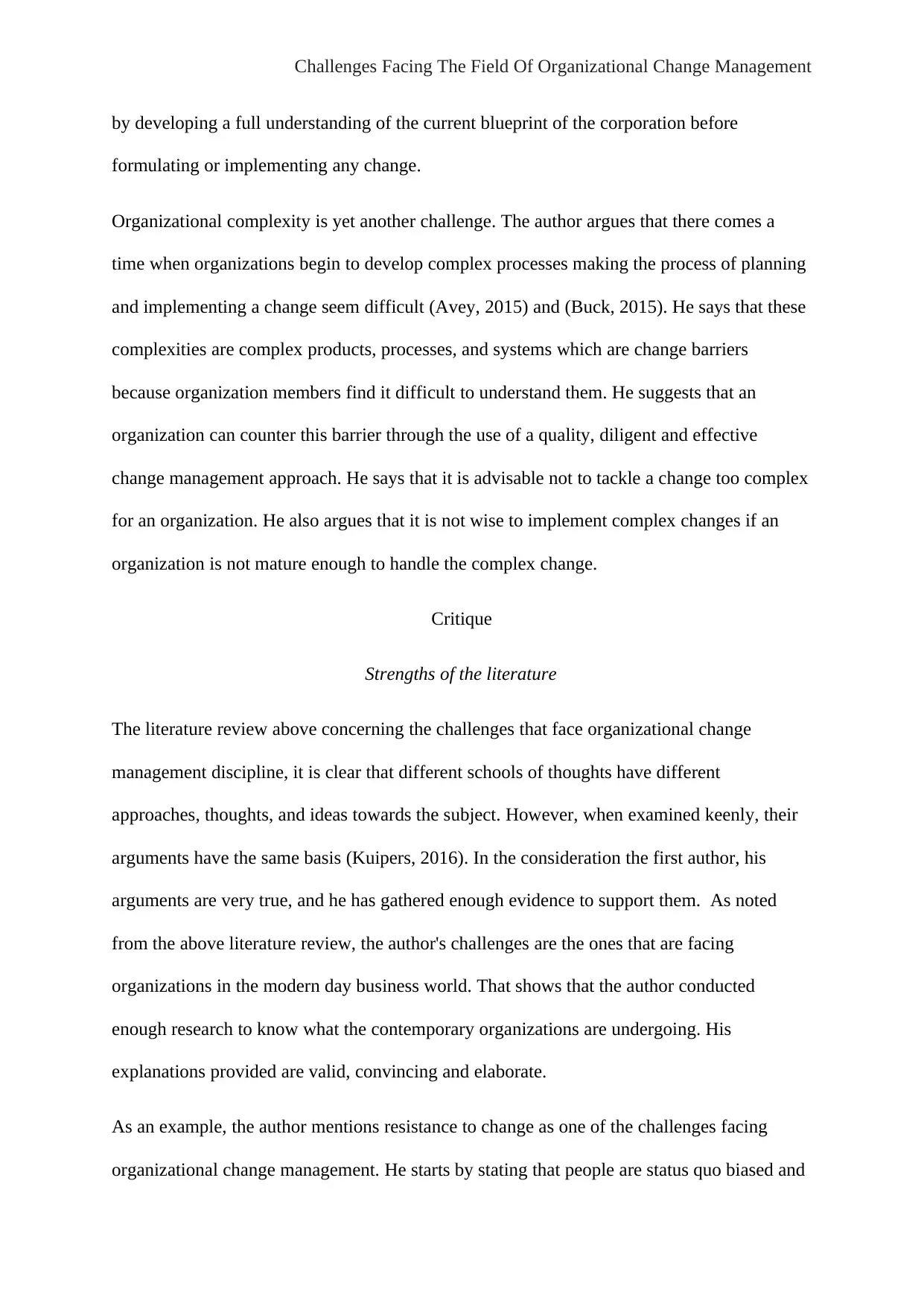
Challenges Facing The Field Of Organizational Change Management
by developing a full understanding of the current blueprint of the corporation before
formulating or implementing any change.
Organizational complexity is yet another challenge. The author argues that there comes a
time when organizations begin to develop complex processes making the process of planning
and implementing a change seem difficult (Avey, 2015) and (Buck, 2015). He says that these
complexities are complex products, processes, and systems which are change barriers
because organization members find it difficult to understand them. He suggests that an
organization can counter this barrier through the use of a quality, diligent and effective
change management approach. He says that it is advisable not to tackle a change too complex
for an organization. He also argues that it is not wise to implement complex changes if an
organization is not mature enough to handle the complex change.
Critique
Strengths of the literature
The literature review above concerning the challenges that face organizational change
management discipline, it is clear that different schools of thoughts have different
approaches, thoughts, and ideas towards the subject. However, when examined keenly, their
arguments have the same basis (Kuipers, 2016). In the consideration the first author, his
arguments are very true, and he has gathered enough evidence to support them. As noted
from the above literature review, the author's challenges are the ones that are facing
organizations in the modern day business world. That shows that the author conducted
enough research to know what the contemporary organizations are undergoing. His
explanations provided are valid, convincing and elaborate.
As an example, the author mentions resistance to change as one of the challenges facing
organizational change management. He starts by stating that people are status quo biased and
by developing a full understanding of the current blueprint of the corporation before
formulating or implementing any change.
Organizational complexity is yet another challenge. The author argues that there comes a
time when organizations begin to develop complex processes making the process of planning
and implementing a change seem difficult (Avey, 2015) and (Buck, 2015). He says that these
complexities are complex products, processes, and systems which are change barriers
because organization members find it difficult to understand them. He suggests that an
organization can counter this barrier through the use of a quality, diligent and effective
change management approach. He says that it is advisable not to tackle a change too complex
for an organization. He also argues that it is not wise to implement complex changes if an
organization is not mature enough to handle the complex change.
Critique
Strengths of the literature
The literature review above concerning the challenges that face organizational change
management discipline, it is clear that different schools of thoughts have different
approaches, thoughts, and ideas towards the subject. However, when examined keenly, their
arguments have the same basis (Kuipers, 2016). In the consideration the first author, his
arguments are very true, and he has gathered enough evidence to support them. As noted
from the above literature review, the author's challenges are the ones that are facing
organizations in the modern day business world. That shows that the author conducted
enough research to know what the contemporary organizations are undergoing. His
explanations provided are valid, convincing and elaborate.
As an example, the author mentions resistance to change as one of the challenges facing
organizational change management. He starts by stating that people are status quo biased and
⊘ This is a preview!⊘
Do you want full access?
Subscribe today to unlock all pages.

Trusted by 1+ million students worldwide
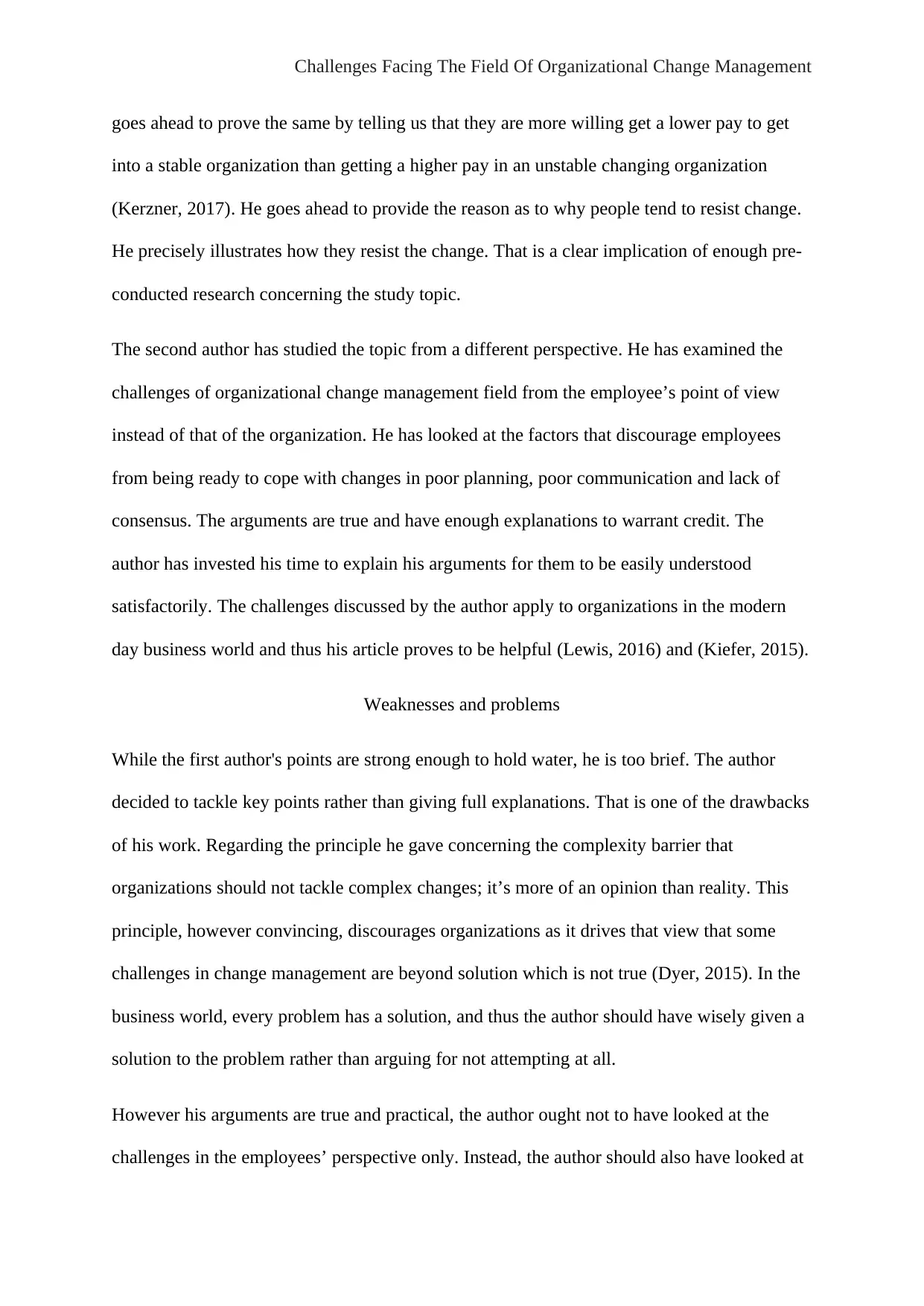
Challenges Facing The Field Of Organizational Change Management
goes ahead to prove the same by telling us that they are more willing get a lower pay to get
into a stable organization than getting a higher pay in an unstable changing organization
(Kerzner, 2017). He goes ahead to provide the reason as to why people tend to resist change.
He precisely illustrates how they resist the change. That is a clear implication of enough pre-
conducted research concerning the study topic.
The second author has studied the topic from a different perspective. He has examined the
challenges of organizational change management field from the employee’s point of view
instead of that of the organization. He has looked at the factors that discourage employees
from being ready to cope with changes in poor planning, poor communication and lack of
consensus. The arguments are true and have enough explanations to warrant credit. The
author has invested his time to explain his arguments for them to be easily understood
satisfactorily. The challenges discussed by the author apply to organizations in the modern
day business world and thus his article proves to be helpful (Lewis, 2016) and (Kiefer, 2015).
Weaknesses and problems
While the first author's points are strong enough to hold water, he is too brief. The author
decided to tackle key points rather than giving full explanations. That is one of the drawbacks
of his work. Regarding the principle he gave concerning the complexity barrier that
organizations should not tackle complex changes; it’s more of an opinion than reality. This
principle, however convincing, discourages organizations as it drives that view that some
challenges in change management are beyond solution which is not true (Dyer, 2015). In the
business world, every problem has a solution, and thus the author should have wisely given a
solution to the problem rather than arguing for not attempting at all.
However his arguments are true and practical, the author ought not to have looked at the
challenges in the employees’ perspective only. Instead, the author should also have looked at
goes ahead to prove the same by telling us that they are more willing get a lower pay to get
into a stable organization than getting a higher pay in an unstable changing organization
(Kerzner, 2017). He goes ahead to provide the reason as to why people tend to resist change.
He precisely illustrates how they resist the change. That is a clear implication of enough pre-
conducted research concerning the study topic.
The second author has studied the topic from a different perspective. He has examined the
challenges of organizational change management field from the employee’s point of view
instead of that of the organization. He has looked at the factors that discourage employees
from being ready to cope with changes in poor planning, poor communication and lack of
consensus. The arguments are true and have enough explanations to warrant credit. The
author has invested his time to explain his arguments for them to be easily understood
satisfactorily. The challenges discussed by the author apply to organizations in the modern
day business world and thus his article proves to be helpful (Lewis, 2016) and (Kiefer, 2015).
Weaknesses and problems
While the first author's points are strong enough to hold water, he is too brief. The author
decided to tackle key points rather than giving full explanations. That is one of the drawbacks
of his work. Regarding the principle he gave concerning the complexity barrier that
organizations should not tackle complex changes; it’s more of an opinion than reality. This
principle, however convincing, discourages organizations as it drives that view that some
challenges in change management are beyond solution which is not true (Dyer, 2015). In the
business world, every problem has a solution, and thus the author should have wisely given a
solution to the problem rather than arguing for not attempting at all.
However his arguments are true and practical, the author ought not to have looked at the
challenges in the employees’ perspective only. Instead, the author should also have looked at
Paraphrase This Document
Need a fresh take? Get an instant paraphrase of this document with our AI Paraphraser
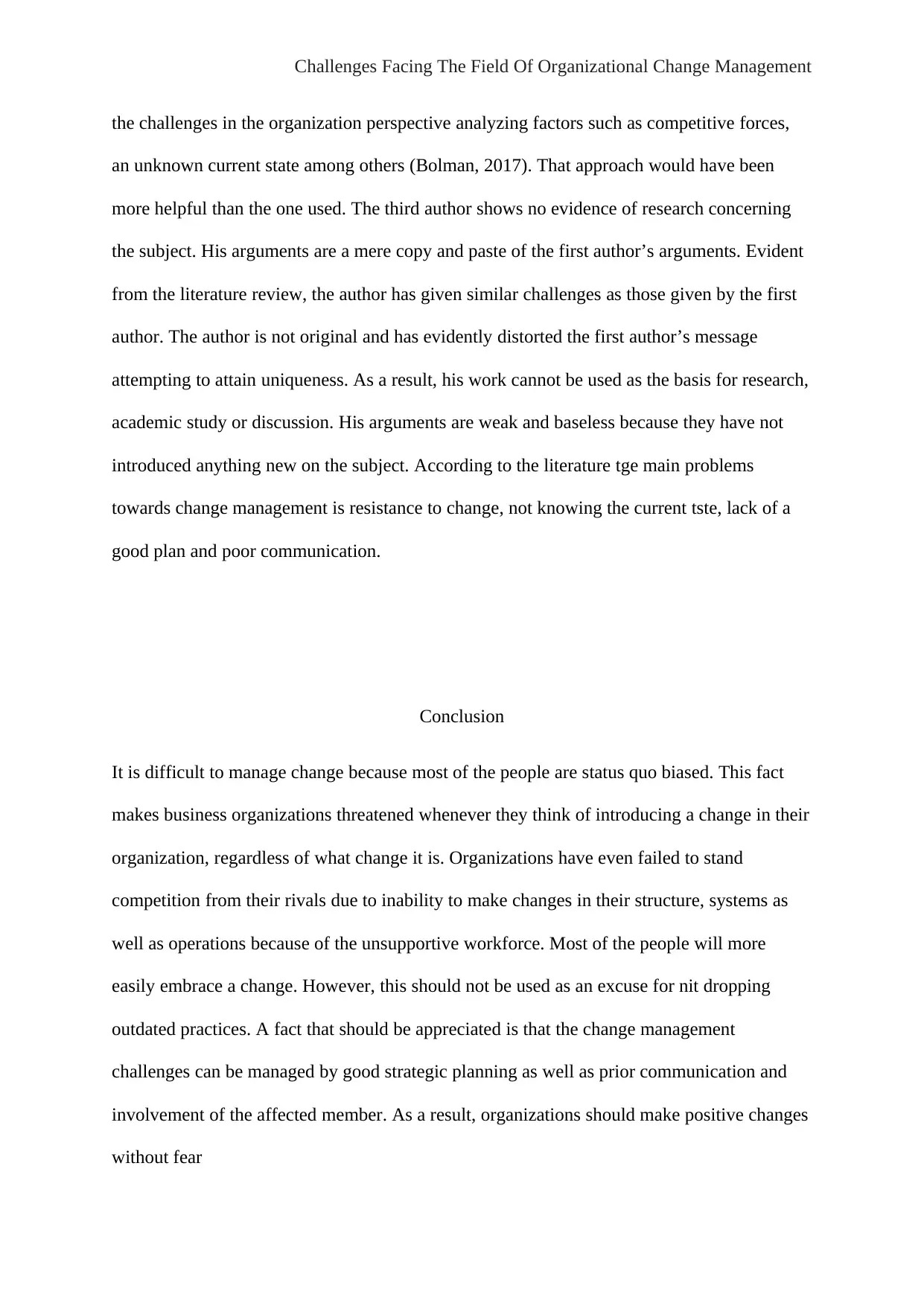
Challenges Facing The Field Of Organizational Change Management
the challenges in the organization perspective analyzing factors such as competitive forces,
an unknown current state among others (Bolman, 2017). That approach would have been
more helpful than the one used. The third author shows no evidence of research concerning
the subject. His arguments are a mere copy and paste of the first author’s arguments. Evident
from the literature review, the author has given similar challenges as those given by the first
author. The author is not original and has evidently distorted the first author’s message
attempting to attain uniqueness. As a result, his work cannot be used as the basis for research,
academic study or discussion. His arguments are weak and baseless because they have not
introduced anything new on the subject. According to the literature tge main problems
towards change management is resistance to change, not knowing the current tste, lack of a
good plan and poor communication.
Conclusion
It is difficult to manage change because most of the people are status quo biased. This fact
makes business organizations threatened whenever they think of introducing a change in their
organization, regardless of what change it is. Organizations have even failed to stand
competition from their rivals due to inability to make changes in their structure, systems as
well as operations because of the unsupportive workforce. Most of the people will more
easily embrace a change. However, this should not be used as an excuse for nit dropping
outdated practices. A fact that should be appreciated is that the change management
challenges can be managed by good strategic planning as well as prior communication and
involvement of the affected member. As a result, organizations should make positive changes
without fear
the challenges in the organization perspective analyzing factors such as competitive forces,
an unknown current state among others (Bolman, 2017). That approach would have been
more helpful than the one used. The third author shows no evidence of research concerning
the subject. His arguments are a mere copy and paste of the first author’s arguments. Evident
from the literature review, the author has given similar challenges as those given by the first
author. The author is not original and has evidently distorted the first author’s message
attempting to attain uniqueness. As a result, his work cannot be used as the basis for research,
academic study or discussion. His arguments are weak and baseless because they have not
introduced anything new on the subject. According to the literature tge main problems
towards change management is resistance to change, not knowing the current tste, lack of a
good plan and poor communication.
Conclusion
It is difficult to manage change because most of the people are status quo biased. This fact
makes business organizations threatened whenever they think of introducing a change in their
organization, regardless of what change it is. Organizations have even failed to stand
competition from their rivals due to inability to make changes in their structure, systems as
well as operations because of the unsupportive workforce. Most of the people will more
easily embrace a change. However, this should not be used as an excuse for nit dropping
outdated practices. A fact that should be appreciated is that the change management
challenges can be managed by good strategic planning as well as prior communication and
involvement of the affected member. As a result, organizations should make positive changes
without fear
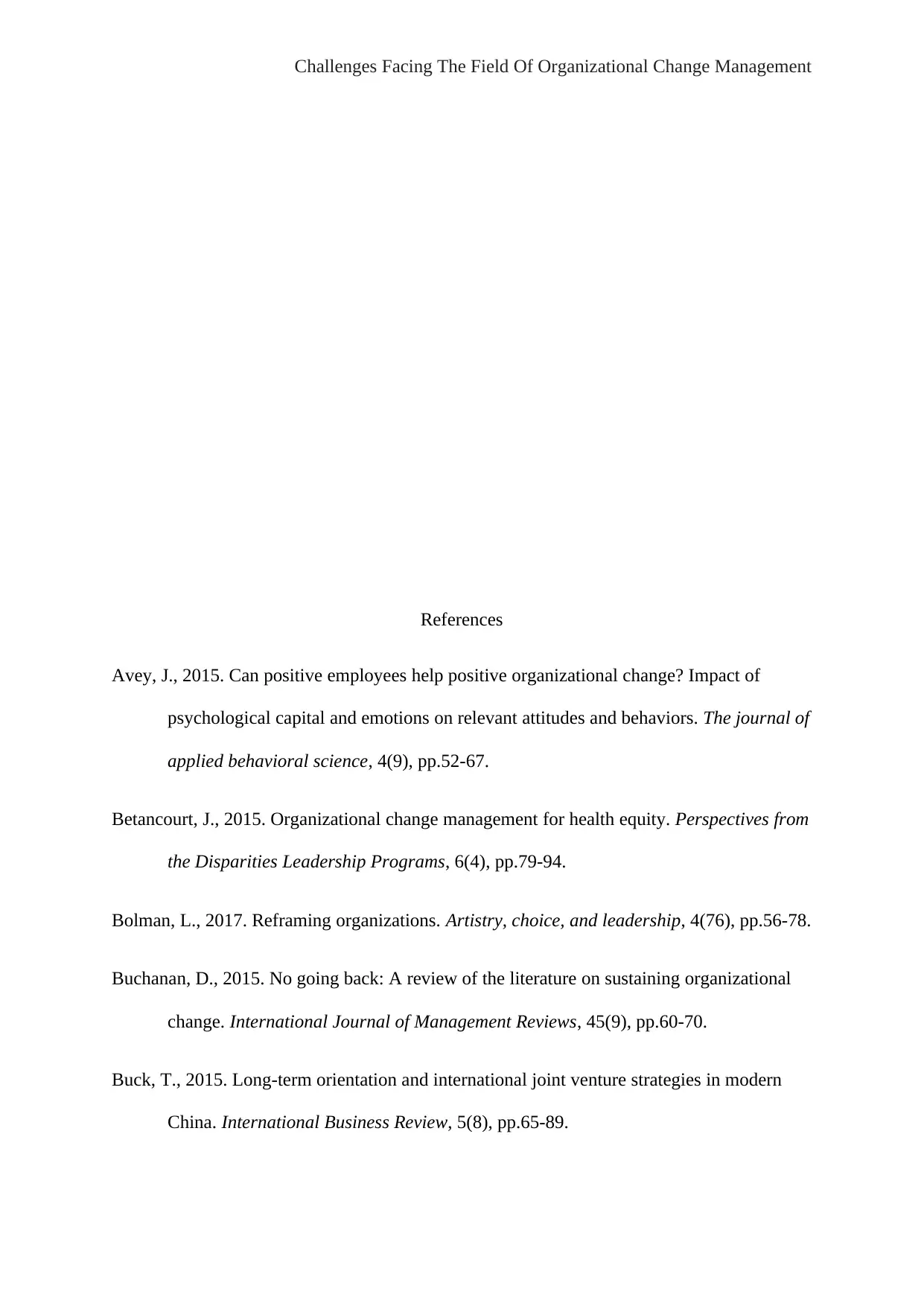
Challenges Facing The Field Of Organizational Change Management
References
Avey, J., 2015. Can positive employees help positive organizational change? Impact of
psychological capital and emotions on relevant attitudes and behaviors. The journal of
applied behavioral science, 4(9), pp.52-67.
Betancourt, J., 2015. Organizational change management for health equity. Perspectives from
the Disparities Leadership Programs, 6(4), pp.79-94.
Bolman, L., 2017. Reframing organizations. Artistry, choice, and leadership, 4(76), pp.56-78.
Buchanan, D., 2015. No going back: A review of the literature on sustaining organizational
change. International Journal of Management Reviews, 45(9), pp.60-70.
Buck, T., 2015. Long-term orientation and international joint venture strategies in modern
China. International Business Review, 5(8), pp.65-89.
References
Avey, J., 2015. Can positive employees help positive organizational change? Impact of
psychological capital and emotions on relevant attitudes and behaviors. The journal of
applied behavioral science, 4(9), pp.52-67.
Betancourt, J., 2015. Organizational change management for health equity. Perspectives from
the Disparities Leadership Programs, 6(4), pp.79-94.
Bolman, L., 2017. Reframing organizations. Artistry, choice, and leadership, 4(76), pp.56-78.
Buchanan, D., 2015. No going back: A review of the literature on sustaining organizational
change. International Journal of Management Reviews, 45(9), pp.60-70.
Buck, T., 2015. Long-term orientation and international joint venture strategies in modern
China. International Business Review, 5(8), pp.65-89.
⊘ This is a preview!⊘
Do you want full access?
Subscribe today to unlock all pages.

Trusted by 1+ million students worldwide
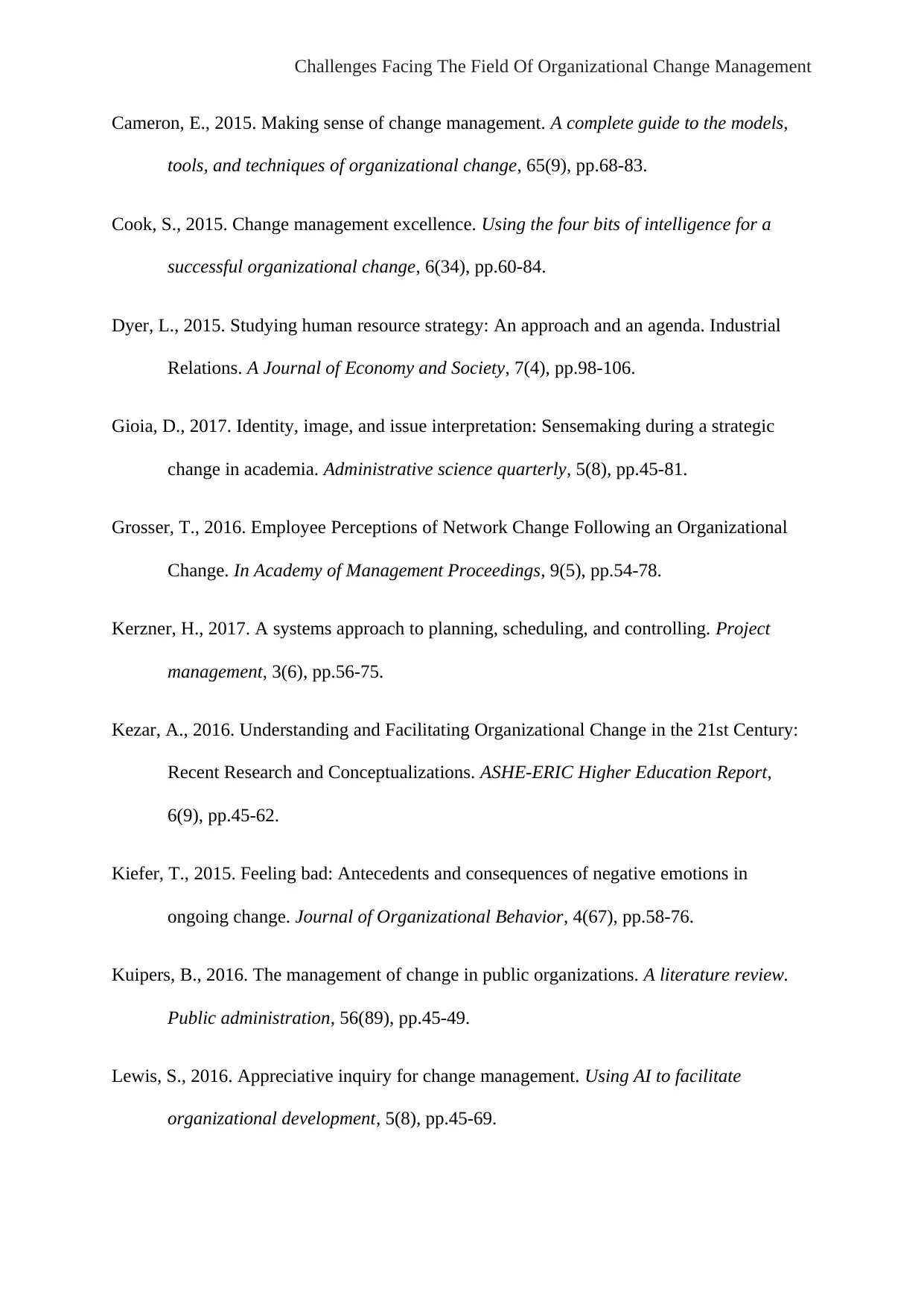
Challenges Facing The Field Of Organizational Change Management
Cameron, E., 2015. Making sense of change management. A complete guide to the models,
tools, and techniques of organizational change, 65(9), pp.68-83.
Cook, S., 2015. Change management excellence. Using the four bits of intelligence for a
successful organizational change, 6(34), pp.60-84.
Dyer, L., 2015. Studying human resource strategy: An approach and an agenda. Industrial
Relations. A Journal of Economy and Society, 7(4), pp.98-106.
Gioia, D., 2017. Identity, image, and issue interpretation: Sensemaking during a strategic
change in academia. Administrative science quarterly, 5(8), pp.45-81.
Grosser, T., 2016. Employee Perceptions of Network Change Following an Organizational
Change. In Academy of Management Proceedings, 9(5), pp.54-78.
Kerzner, H., 2017. A systems approach to planning, scheduling, and controlling. Project
management, 3(6), pp.56-75.
Kezar, A., 2016. Understanding and Facilitating Organizational Change in the 21st Century:
Recent Research and Conceptualizations. ASHE-ERIC Higher Education Report,
6(9), pp.45-62.
Kiefer, T., 2015. Feeling bad: Antecedents and consequences of negative emotions in
ongoing change. Journal of Organizational Behavior, 4(67), pp.58-76.
Kuipers, B., 2016. The management of change in public organizations. A literature review.
Public administration, 56(89), pp.45-49.
Lewis, S., 2016. Appreciative inquiry for change management. Using AI to facilitate
organizational development, 5(8), pp.45-69.
Cameron, E., 2015. Making sense of change management. A complete guide to the models,
tools, and techniques of organizational change, 65(9), pp.68-83.
Cook, S., 2015. Change management excellence. Using the four bits of intelligence for a
successful organizational change, 6(34), pp.60-84.
Dyer, L., 2015. Studying human resource strategy: An approach and an agenda. Industrial
Relations. A Journal of Economy and Society, 7(4), pp.98-106.
Gioia, D., 2017. Identity, image, and issue interpretation: Sensemaking during a strategic
change in academia. Administrative science quarterly, 5(8), pp.45-81.
Grosser, T., 2016. Employee Perceptions of Network Change Following an Organizational
Change. In Academy of Management Proceedings, 9(5), pp.54-78.
Kerzner, H., 2017. A systems approach to planning, scheduling, and controlling. Project
management, 3(6), pp.56-75.
Kezar, A., 2016. Understanding and Facilitating Organizational Change in the 21st Century:
Recent Research and Conceptualizations. ASHE-ERIC Higher Education Report,
6(9), pp.45-62.
Kiefer, T., 2015. Feeling bad: Antecedents and consequences of negative emotions in
ongoing change. Journal of Organizational Behavior, 4(67), pp.58-76.
Kuipers, B., 2016. The management of change in public organizations. A literature review.
Public administration, 56(89), pp.45-49.
Lewis, S., 2016. Appreciative inquiry for change management. Using AI to facilitate
organizational development, 5(8), pp.45-69.
Paraphrase This Document
Need a fresh take? Get an instant paraphrase of this document with our AI Paraphraser
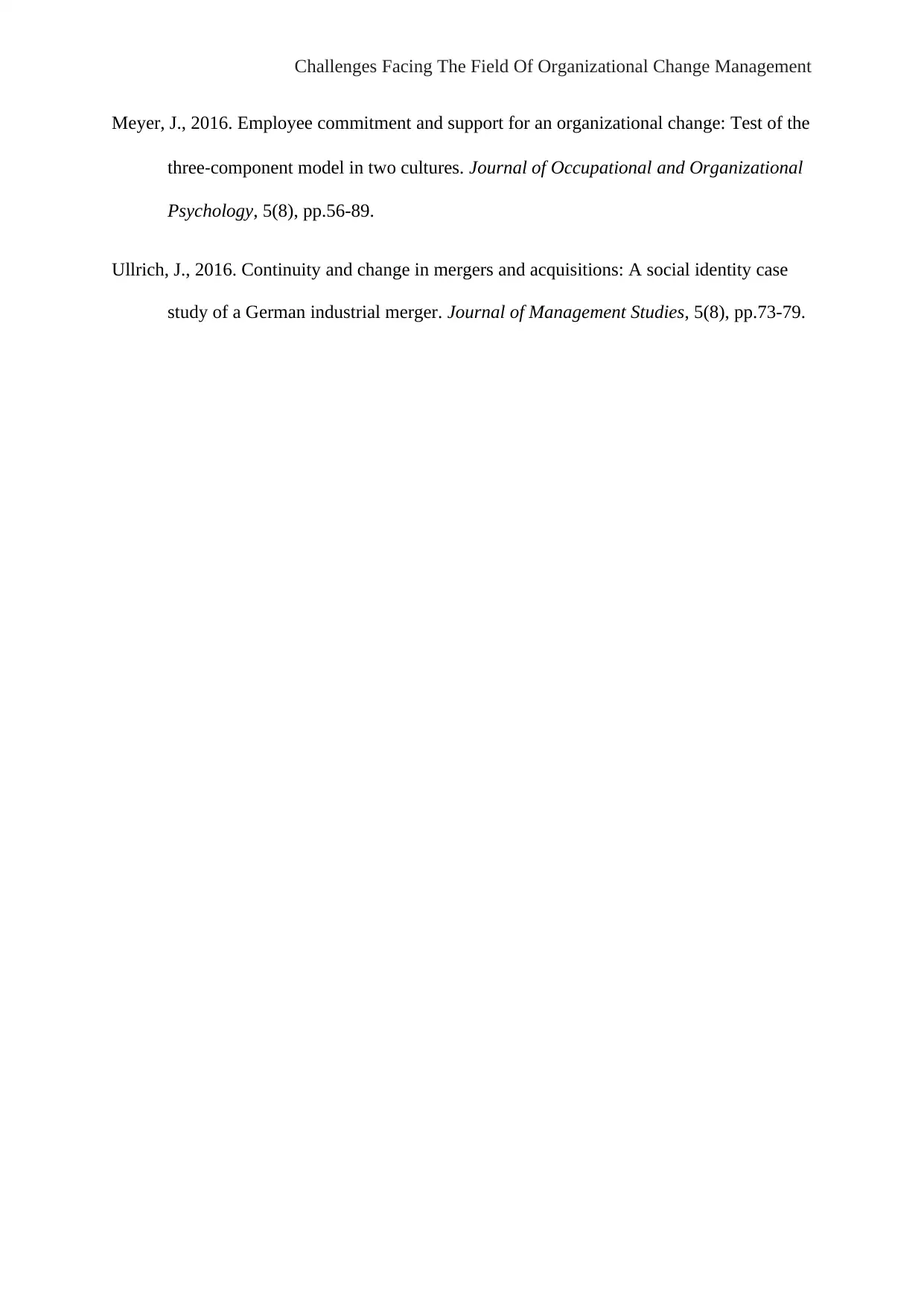
Challenges Facing The Field Of Organizational Change Management
Meyer, J., 2016. Employee commitment and support for an organizational change: Test of the
three‐component model in two cultures. Journal of Occupational and Organizational
Psychology, 5(8), pp.56-89.
Ullrich, J., 2016. Continuity and change in mergers and acquisitions: A social identity case
study of a German industrial merger. Journal of Management Studies, 5(8), pp.73-79.
Meyer, J., 2016. Employee commitment and support for an organizational change: Test of the
three‐component model in two cultures. Journal of Occupational and Organizational
Psychology, 5(8), pp.56-89.
Ullrich, J., 2016. Continuity and change in mergers and acquisitions: A social identity case
study of a German industrial merger. Journal of Management Studies, 5(8), pp.73-79.
1 out of 11
Related Documents
Your All-in-One AI-Powered Toolkit for Academic Success.
+13062052269
info@desklib.com
Available 24*7 on WhatsApp / Email
![[object Object]](/_next/static/media/star-bottom.7253800d.svg)
Unlock your academic potential
Copyright © 2020–2026 A2Z Services. All Rights Reserved. Developed and managed by ZUCOL.




